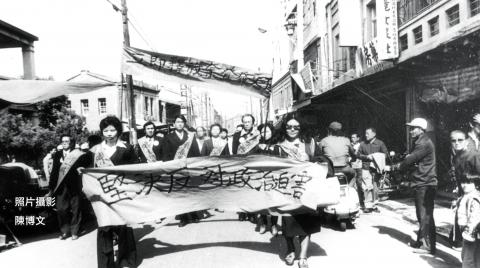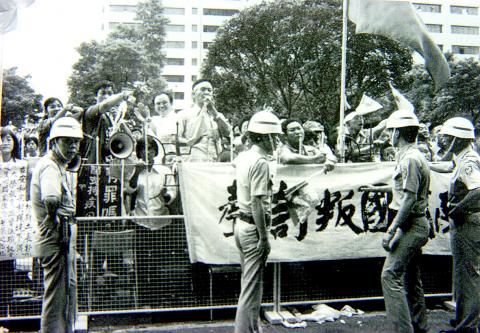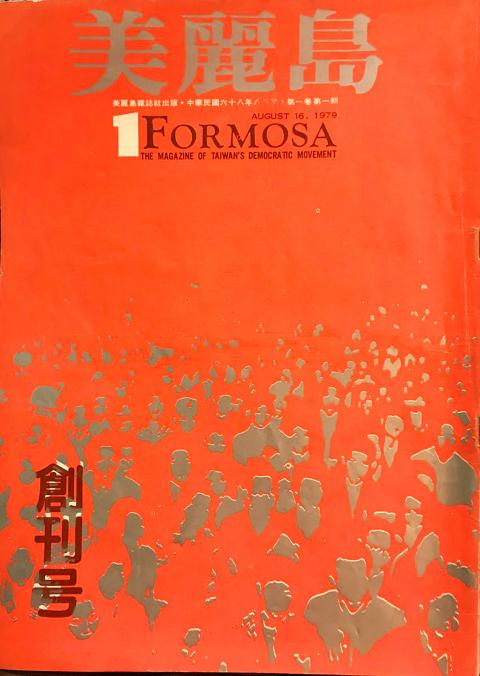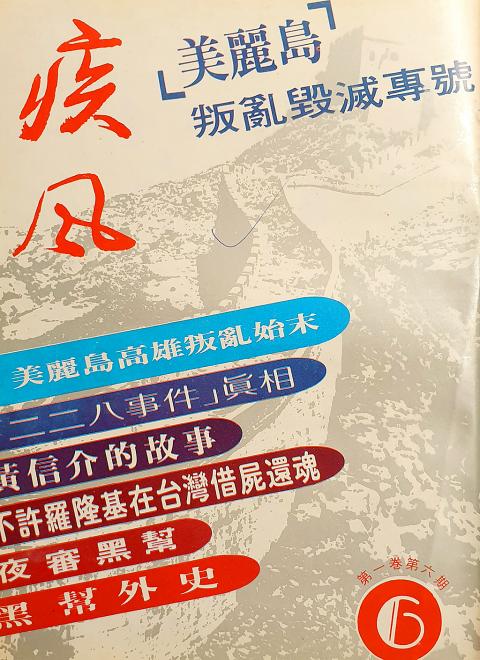Dec 9 to Dec 15
As Formosa magazine (美麗島雜誌) celebrated its launch on Sept. 8, 1979 at the Mandarina Crown Hotel (中泰賓館), members and supporters of Ji Feng magazine (疾風雜誌) gathered outside.
The two publications were naturally at odds with each other — Formosa was the mouthpiece of the dangwai (黨外), or politicians who opposed the Chinese Nationalist Party’s (KMT) one-party rule, while Ji Feng was founded to counter the opposition, whom it called “Taiwanese independence mobsters (台灣獨立黑拳幫).”

Photo courtesy of Chen Po-wen
The official reason for Ji Feng’s gathering was to denounce the “traitor” Chen Wan-chen (陳婉真), who supported the dangwai from the US after being blacklisted from Taiwan for her political activities. Bringing a contingent of high school students, they yelled patriotic slogans and tried to block people from entering and leaving the hotel. Although there were skirmishes, the Mandarina Crown Hotel Incident did not descend into chaos — that would come three months later.
This event was just one of many conflicts that culminated in the Kaohsiung Incident, or Formosa Incident, on Dec. 10, 1979, when police and protesters clashed during a pro-democracy rally organized by Formosa magazine.
Much has been written about the incident and its ramifications, but everything began a year earlier, when the US announced that it would break relations with Taiwan for China.

Photo: Chu Pei-hsiung, Taipei Times
SIMMERING TENSIONS
Having made significant political gains in the local elections of 1977 — despite accusations that the KMT rigged votes — the dangwai was hoping to further its success during the supplementary elections for the national assembly and legislature.
Since opposition political parties were banned, these independent candidates formed a dangwai canvassing team in October 1978 to campaign as a group, which alarmed the government. Their collective platform included ending martial law, government censorship, the ban on new political parties and discrimination against local languages, and calling for the release of political prisoners.

Photo courtesy of National Central Library
The first incident broke out on Dec. 6 during a dangwai press conference, when then-legislator Huang Hsin-chieh (黃信介) changed a phrase in the national anthem from “my party” to “my people,” causing pro-KMT politicians to rush the stage.
When the US announced that it was breaking relations with Taiwan for China on Dec. 16, just six days before the vote, the government suspended the elections. They issued several warnings that any pro-independence or anti-government activities would be severely punished. But on Dec. 25, the dangwai released a public statement criticizing the KMT’s authoritarian rule and reiterating its previous demands for democracy and freedom.
A month later, the government arrested dangwai leader Yu Teng-fa (余登發), tying him and his son to a sedition case and sentencing them to eight and two years in jail respectively. Led by then-Taoyuan County Commissioner Hsu Hsin-liang (許信良), the dangwai took to the streets for the first time to call for Yu’s release. The government then shut down two dangwai publications and moved to impeach Hsu for his actions.

Photo courtesy of National Central Library
The dangwai continued to organize gatherings throughout 1979, but in July, the government started suppressing them by force. On Aug. 4, the police shut down the underground newspaper Chao Liu (潮流) and arrested two of its staff in a widely-publicized incident after co-founder Chen, the dangwai supporter, protested by staging a hunger strike at Taiwan’s representative office in New York.
OPPOSING MAGAZINES
Ji Feng was founded on July 7, 1979. It slams the dangwai in its introductory statement.
“What makes us infinitely angry is that while Taiwan, Kinmen and Matsu have achieved peace and prosperity never seen in thousands of years of Chinese history… there’s a tiny countercurrent — the aspirant Taiwanese independence mobsters. They are driven by power and desire, and walk the same road as the communist bandits. They have willingly oppressed China on behalf of Westerners, using ‘democracy and human rights’ as a guise to incite violence and divide our territory and destroy our glorious achievements on this base to reclaim China… Our compatriots, it is time for the silent majority to attack these bandits! Let us unite and strike relentlessly and viciously against these demons!”
Formosa released its first edition on Aug. 16, 1979. Huang, the legislator, writes in the introduction: “Faced with national fervor toward the elections, the KMT panicked due to its political crisis [with the US]. It hurriedly stopped the elections and has been using all sorts of high-pressure tactics to destroy this tide of democracy, causing much worry and uncertainty in society over the past half-year… But democracy will not die. Long live the elections! We are encouraged by the people’s passion to participate in politics, and strongly believe that democracy is the tide of the times and cannot be stopped! This is why we have determinedly founded Formosa magazine to push forward the political movement of the new generation!”
In its third issue, the Ji Feng camp called their actions at the Mandarina Crown Hotel a “large-scale and far-reaching patriotic movement to save the country,” vowing that they would continue to take action until the “independence mobsters” were stopped.
Despite this vow, Ji Feng denied involvement when Formosa’s office and Huang’s home were ransacked by unknown attackers. Instead, they claimed that Formosa staff orchestrated the attacks themselves to gain sympathy and make the KMT look bad, in order to justify their “rebellious actions.”
In its sixth issue, Ji Feng celebrated the Kaohsiung Incident, stating: “The night of Dec. 10 is when god willed the utter destruction of these independence mobsters.”
Little would they know that today, the incident is now remembered as the turning point in Taiwan’s struggle for democracy.
Taiwan in Time, a column about Taiwan’s history that is published every Sunday, spotlights important or interesting events around the nation that have anniversaries this week.

June 9 to June 15 A photo of two men riding trendy high-wheel Penny-Farthing bicycles past a Qing Dynasty gate aptly captures the essence of Taipei in 1897 — a newly colonized city on the cusp of great change. The Japanese began making significant modifications to the cityscape in 1899, tearing down Qing-era structures, widening boulevards and installing Western-style infrastructure and buildings. The photographer, Minosuke Imamura, only spent a year in Taiwan as a cartographer for the governor-general’s office, but he left behind a treasure trove of 130 images showing life at the onset of Japanese rule, spanning July 1897 to

In an interview posted online by United Daily News (UDN) on May 26, current Chinese Nationalist Party (KMT) Chairman Eric Chu (朱立倫) was asked about Taichung Mayor Lu Shiow-yen (盧秀燕) replacing him as party chair. Though not yet officially running, by the customs of Taiwan politics, Lu has been signalling she is both running for party chair and to be the party’s 2028 presidential candidate. She told an international media outlet that she was considering a run. She also gave a speech in Keelung on national priorities and foreign affairs. For details, see the May 23 edition of this column,

The Taiwan People’s Party (TPP) on May 18 held a rally in Taichung to mark the anniversary of President William Lai’s (賴清德) inauguration on May 20. The title of the rally could be loosely translated to “May 18 recall fraudulent goods” (518退貨ㄌㄨㄚˋ!). Unlike in English, where the terms are the same, “recall” (退貨) in this context refers to product recalls due to damaged, defective or fraudulent merchandise, not the political recalls (罷免) currently dominating the headlines. I attended the rally to determine if the impression was correct that the TPP under party Chairman Huang Kuo-Chang (黃國昌) had little of a

At Computex 2025, Nvidia CEO Jensen Huang (黃仁勳) urged the government to subsidize AI. “All schools in Taiwan must integrate AI into their curricula,” he declared. A few months earlier, he said, “If I were a student today, I’d immediately start using tools like ChatGPT, Gemini Pro and Grok to learn, write and accelerate my thinking.” Huang sees the AI-bullet train leaving the station. And as one of its drivers, he’s worried about youth not getting on board — bad for their careers, and bad for his workforce. As a semiconductor supply-chain powerhouse and AI hub wannabe, Taiwan is seeing